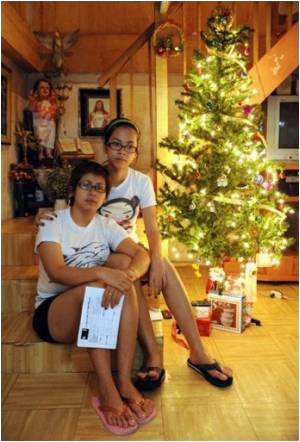
They say cyber pimps are offering cheap services via the Internet in a seedy mutation of the country's sunshine outsource industry in which call centre work and other back-office operations are done for companies in richer countries.
In one recent police raid on a house in Olangapo city in the northern Philippines, five girls aged 14-18 and three women were found performing sex acts in front of web cameras for clients sitting at computers overseas.
"It's a lot like working for a call centre. We do shifts and we chat. They can also make us do anything, as long as they pay," said one of the girls picked up in the raid who used the working nickname of Rainbow.
The girl, 15, and her sister, 17, told AFP they left their rural home on a northern Philippine mango orchard to work for their aunt in Olongapo, but that their planned employment as babysitters turned into cybersex work.
"It took us about a week to adjust, but after that, we became blase about it," said the elder sister, adding their aunt had stayed beside them during their work to ensure the online clients' demands were met.
The aunt was arrested in the raid in October and has been charged with trafficking in children for prostitution, which carries a maximum penalty of life in jail.
A police report of the raid shown to AFP said of the younger girl: "One of them was naked while in the act of inserting a sex toy in her mouth in a scandalous position."
The girls are now undergoing counselling and rehabilitation at a local children's centre run by an Irish Catholic priest.
The centre's lawyer and counsellor, a trained psychologist, gave AFP permission to speak with the girls. The counsellor was present when the interview took place.
Although police raids on cyber sex dens across the country are turning up women and children almost every week, they could be the tip of the iceberg, said law enforcer Migdonio Congzon of the National Bureau of Investigation.
"It's an economic issue. People are poor and they need the money," Congzon, the bureau's computer crimes chief, told AFP.
"There is no definite set up. It could be a house, it could be a condo unit, it could be anything else as long as you have computers with cameras and an Internet connection."
Authorities appear ill-prepared to deal with the mushrooming industry.
The bureau, which is the investigative arm of the justice ministry, has just five experts on computer crime who also have to deal with Internet fraud and privacy cases. Philippine's national police also have just five cyber experts.
Congzon also said the country needed a law that directly addressed outsourced cybersex, because the current ones on child prostitution were not specific enough to deal with the Internet age.
Dolores Alforte, a member of a government committee on child welfare, said police only acted on a few of many tip-offs because most cybersex operations were ran out of private homes that could not be raided without a court order.
She said law enforcement efforts were further hampered by a wall of silence put up by neighbourhoods where there is social acceptance of cybersex.
Alforte recalled a 2005 case when 70 children from a depressed Manila neighbourhood were paid a bag of groceries and 3,000 pesos (70 dollars) to be videotaped by a Japanese filmmaker.
The tapes were later uploaded on the Internet but prosecutors decided to drop the case against the Japanese suspect, she added.
Alforte said the dens charged clients anywhere from 15 dollars an hour to 10 dollars a minute.
She said most dens operated near money transfer facilities, although some of the more sophisticated operations now got paid via credit cards.
Teresa Calubid, a psychologist at the church-backed Preda Foundation helping the girls from the Olongapo cybersex raid, said they faced the prospect of having to stay at the shelter until the case went to trial.
"Their parents want them back, but at this stage it is just not possible," Calubid told AFP.
"There's a possibility that the pimp and recruiter would get back at them, or the parents will be pressured to drop the case."
Source-AFP









